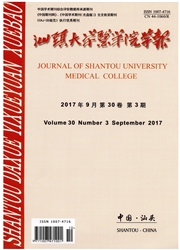

 中文摘要:
中文摘要:
目的:研究人流感病毒(H1N1)及禽流感病毒(H5N1)感染人神经胶质细胞后,促炎症因子的分泌特点。方法:分离培养人胶质细胞,用H1N1及H5N1分别感染刺激人胶质细胞;用RT-PCR技术探求白细胞介素(IL)-1β、-6和肿瘤坏死因子(TNF)-α变化。结果:与阴性对照比,H1N1和H5N1感染人神经胶质细胞IL-1β、-6和TNF-α的表达量均增高,且H5N1的表达量多于H1N1。结论:H1N1与H5N1可体外感染人神经胶质细胞,并诱导其分泌大量促炎症因子,提示此与流感病毒感染中枢神经系统所致的功能紊乱及免疫病理损伤有关。
 英文摘要:
英文摘要:
Objective:To study characteristics of pro-inflammatory cytokine expression by human glial cells after H1N1 or H5N1 influenza virus infection.Methods:Primary human fetal glial cells were infected by H1N1 and H5N1.After infection,the expressions of IL-1β,-6 and TNF-α were detected by RT-PCR.Results:Compared to negative control,the expressions of IL-1β,-6 and TNF-α mRNA were up-regulated in H1N1 and H5N1 influenza viruses infected human glial cells,and their expression levels were considerably higher in H5N1 infection.Conclusion:Both human H1N1 and avian H5N1 can infect human glial cells and induce pro-inflammatory cytokine production in vitro,suggesting the consequences of dysfunction and immunopathological injury in the central nervous system after influenza viruses infection.
 同期刊论文项目
同期刊论文项目
 同项目期刊论文
同项目期刊论文
 Drug Screening for Autophagy Inhibitors Based on the Dissociation of Beclin1-Bcl2 Complex Using BiFC
Drug Screening for Autophagy Inhibitors Based on the Dissociation of Beclin1-Bcl2 Complex Using BiFC Inability of NS1 protein from an H5N1 influenza virus to activate PI3K/Akt signaling pathway correla
Inability of NS1 protein from an H5N1 influenza virus to activate PI3K/Akt signaling pathway correla Identificationof23-(S)-2-Amino-3-Phenylpropanoyl-Silybin as an Antiviral Agent for Influenza A Virus
Identificationof23-(S)-2-Amino-3-Phenylpropanoyl-Silybin as an Antiviral Agent for Influenza A Virus The distinct binding properties between avian/human influenza A virus NS1 and Postsynapticdensity pr
The distinct binding properties between avian/human influenza A virus NS1 and Postsynapticdensity pr Asymmetric Production of Nitric Oxide in Mouse Primary Cortical Mixed Glial Cell Cultures Treated Wi
Asymmetric Production of Nitric Oxide in Mouse Primary Cortical Mixed Glial Cell Cultures Treated Wi 期刊信息
期刊信息
